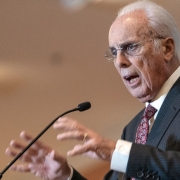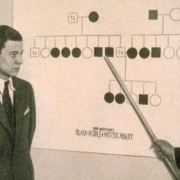Knocking down the straw man of theological liberalism
This article originally appeared on August 30, 2021 at Baptist News Global.
One of the growing frustrations many deconstructing Christians, ex-evangelicals, liberationist and liberal theologians share is how conservative organizations like The Gospel Coalition constantly misrepresent us through “straw man” fallacies.
In the field of logic, a “straw man” is when somebody twists or exaggerates another person’s position and then argues against the distortion.
In recent years, theological conservatives have gone beyond simply distorting the positions of Christians they consider to be liberal, but have gone so far as to criticize the empathy and compassion that more liberal Christians have.

Rick Pidcock
As conversations have been picking up nationally about conservatives criticizing empathy, TGC tweeted an article on Aug. 28 by Dan Doriani against “Friendly Theological Liberalism: A Threat in Every Age.” Doriani is a theology professor at Covenant Theological Seminary, which is affiliated with the Presbyterian Church in America.
What quickly becomes clear, however, is that Doriani either has no knowledge of theological liberalism or no willingness to define it accurately. Here are four ways Doriani misrepresents those he would define as theological liberals.
The goal of liberalism
In his introduction, Doriani says, “The liberal theologian’s goal is to rescue Christianity by excising the elements that seem most offensive in that day. In one era, the doctrine of sin is unacceptable; in another, it’s miracles; in another, it’s the virgin birth, the substitutionary atonement, or biblical sex ethics. But the theme is the same: In order to make Christianity believable, certain doctrines must be abandoned.”
But the liberals I’ve known or read are not concerned with “rescuing” Christianity. For example, Howard Thurman was a 20th century Black early liberationist preacher, writer and professor whom TGC would consider a liberal. Out of more than 30 books, articles and lectures either by or about Thurman, the topic of atonement comes up just twice.
“The liberals I’ve known or read are not concerned with ‘rescuing’ Christianity.”
In “The Twofold Encounter” from The Inward Journey, Thurman says, “Man dare not face God on the Day of Atonement, seeking a right relation with him, unless man has already exhausted himself in redeeming all the broken relationships that he has with his fellows.”
Then in The Christian Minister and the Desegregation Decision, Thurman says, “Man emerges from his spiritual crisis deeply chastened, and a new sense of community without boundaries begins to make revolutionary demands upon his total life pattern. His task now becomes not only one of atonement as the catharsis for his guilt but also a new sense of social responsibility becomes a part of his Christian commitment.”
 In those instances, Thurman’s atonement theology is mentioned as a theory toward the repairing of relationships in a social justice framework. He would have lined up much more with the moral example atonement theory of the 12th century’s Peter Abelard than with the satisfaction theory of Anselm that eventually would give birth to Calvin’s penal substitutionary atonement theory that TGC promotes as “the gospel.”
In those instances, Thurman’s atonement theology is mentioned as a theory toward the repairing of relationships in a social justice framework. He would have lined up much more with the moral example atonement theory of the 12th century’s Peter Abelard than with the satisfaction theory of Anselm that eventually would give birth to Calvin’s penal substitutionary atonement theory that TGC promotes as “the gospel.”
Additionally, Thurman was progressive in his sexual ethics, even writing his master’s thesis in 1926 about how prohibitions against pre-marital sex have been built on sexist, hierarchical theologies that oppress women — primarily the ancient and outdated belief that women are either the property of their fathers or their husbands.
In other words, according to TGC, Thurman would be considered a “liberal theologian.” So did Thurman ever say his goal was to rescue Christianity?










Leave a Reply
Want to join the discussion?Feel free to contribute!